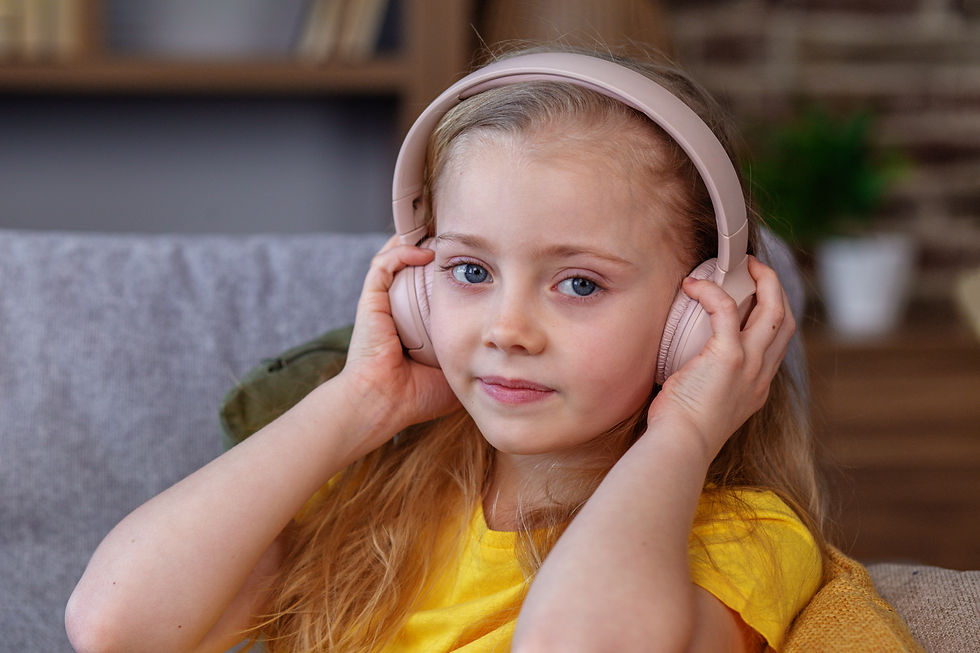Can Music Help with ADHD and Focus?
- Taylor Fends

- Jul 31, 2025
- 2 min read

Attention-Deficit/Hyperactivity Disorder (ADHD) affects millions of children and adults worldwide. Common symptoms include inattention, impulsivity, and difficulty with sustained focus. While medication and therapy are the most recognized treatments, many families and educators are also exploring alternative or complementary approaches, such as music.
But can music really help someone with ADHD focus? Let’s take a closer look.
🎧 The Science Behind Music and the ADHD Brain
People with ADHD often struggle with under-stimulation in the brain’s frontal lobe, the part responsible for planning, attention, and impulse control. Music activates multiple areas of the brain, including the frontal lobe, and can help regulate mood, increase motivation, and create structure—three key areas where individuals with ADHD may need extra support.
Research shows that music:
Increases dopamine levels (a chemical often lacking in ADHD brains)
Helps the brain transition between tasks
Encourages predictable routines when used in daily practice

🎶 Playing Music vs. Listening to Music
Both can be beneficial—but in different ways.
✅ Listening to Music
Calming instrumental music, especially with steady rhythms or repetitive patterns, can serve as background "white noise" that helps reduce distractions. It can also lower anxiety, which often accompanies ADHD.
Best types of music for focus:
Classical (especially Baroque with 60 bpm)
Lo-fi beats
Nature sounds with soft melody
Instrumental jazz or acoustic playlists
🛑 Avoid music with lyrics when studying or doing complex tasks, as this can increase cognitive load and reduce comprehension for some people.
✅ Playing an Instrument
Learning an instrument can be a powerful tool for people with ADHD. It involves:
Focused attention on technique and sound
Routine and structure in daily practice
Emotional regulation through expression and creativity
Physical activity, especially with percussion or wind instruments
In fact, some music educators note that students with ADHD often thrive in lessons, especially when lessons are engaging and involve movement, rhythm games, or quick transitions.

🧠 Music as a Therapy Tool
Music therapy is a growing field that uses musical experiences to achieve non-musical goals. For ADHD, this might include:
Improving impulse control
Increasing attention span
Encouraging self-expression
Reducing anxiety and promoting relaxation
A board-certified music therapist can tailor sessions specifically to a child or adult’s needs, making it a great option for families exploring holistic approaches.
🎵 How to Incorporate Music into Daily Life
Here are some easy ways to make music a helpful ally in your ADHD toolbox:
Create a study playlist with soft, repetitive tracks
Use music to signal transitions, like brushing teeth or getting ready for bed
Make practice fun with rhythm games or short musical challenges
Enroll in music lessons that use movement, variety, and positive reinforcement
Try drumming or percussion as a healthy outlet for excess energy

🎓 Final Thoughts
Music isn’t a cure for ADHD—but it can be a powerful support tool. Whether through listening, playing, or participating in music-based activities, children and adults with ADHD may find improved focus, greater self-esteem, and a joyful way to express themselves.
At Musician’s Addition, we believe music should be accessible and empowering for everyone, including neurodiverse learners. From practice games to fun lessons, our resources are designed to keep music engaging, effective, and full of heart.








Comments